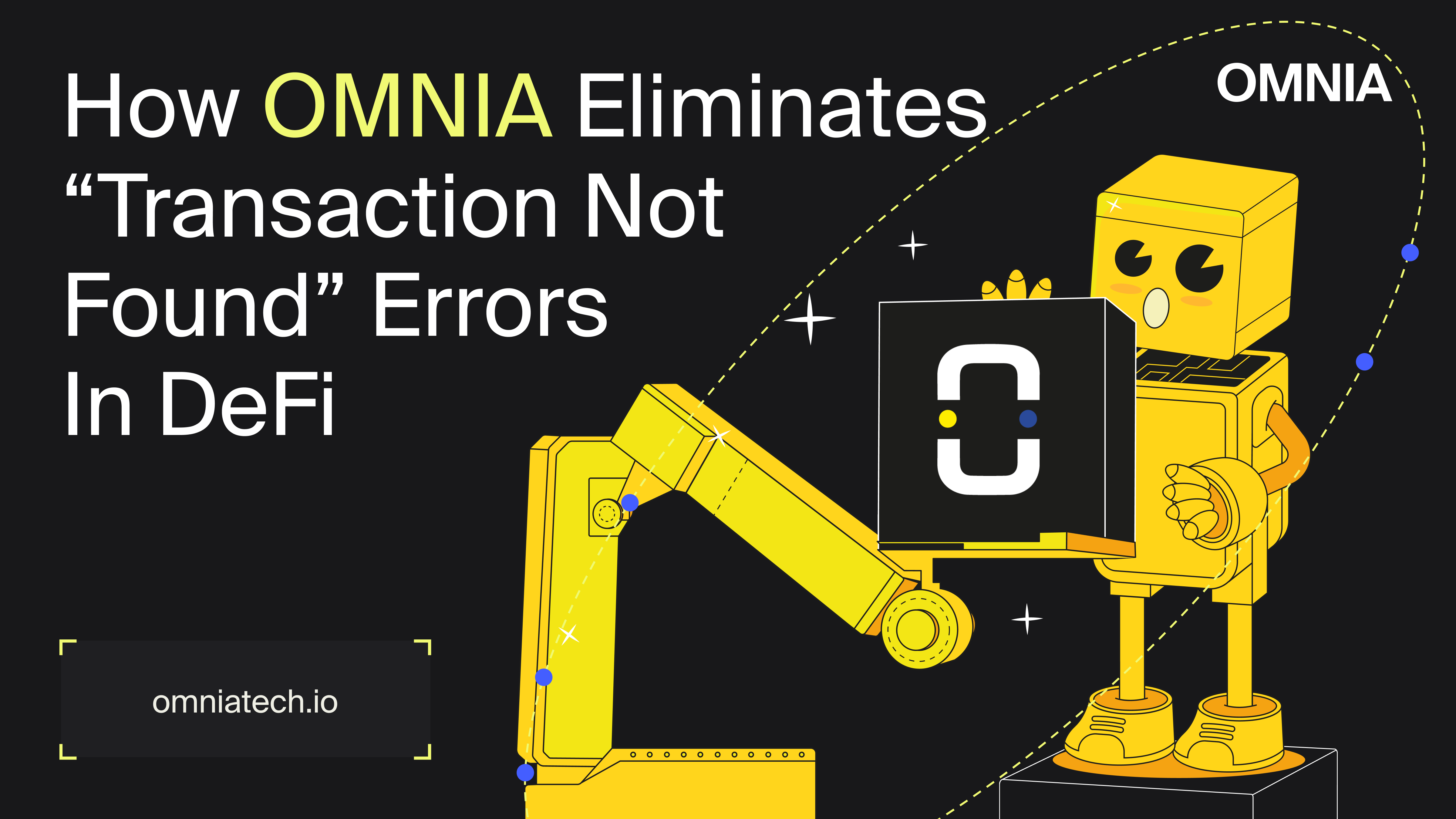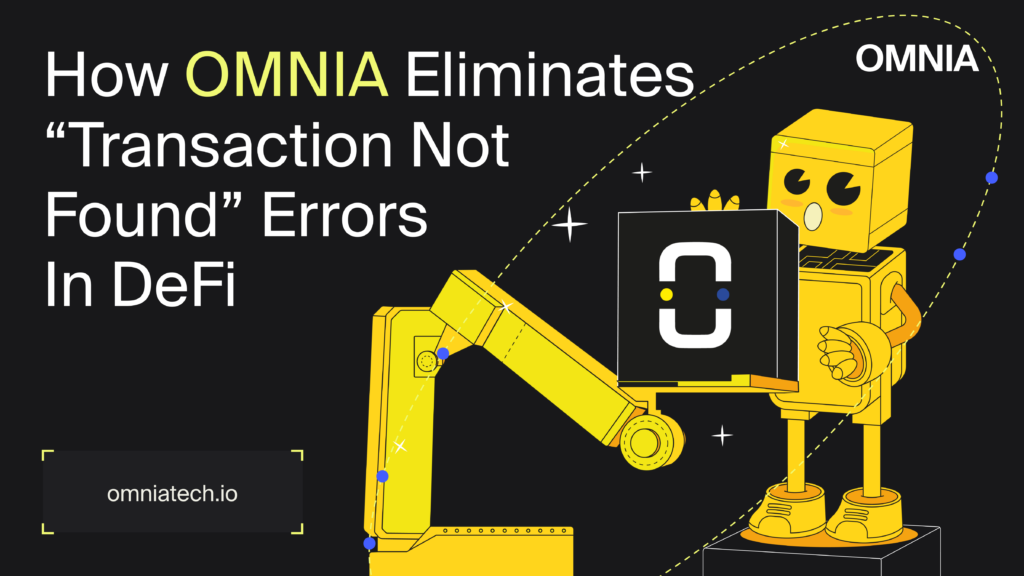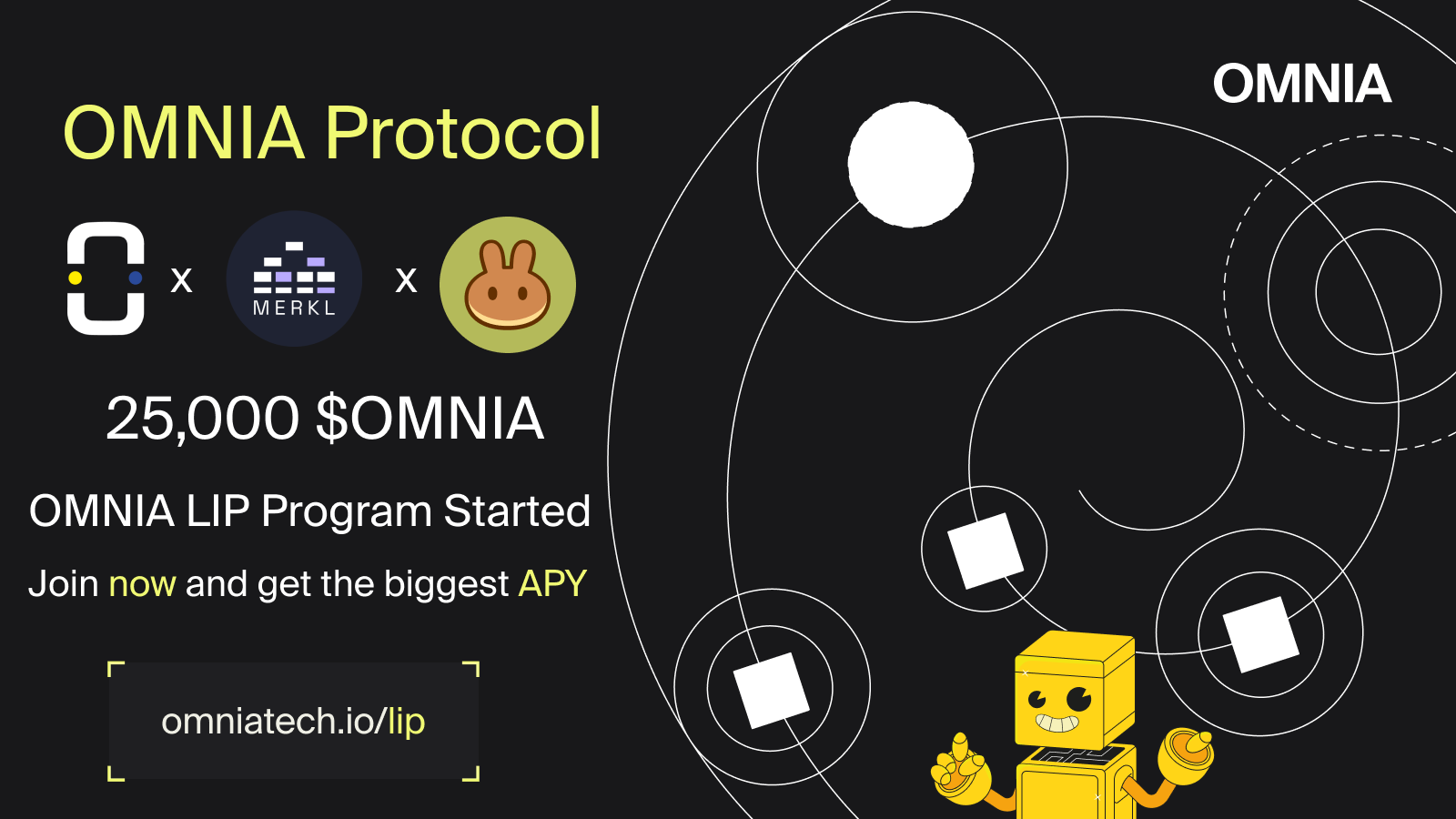
How OMNIA Protocol Eliminates “Transaction Not Found” Errors In DeFi

DeFi is the best alternative to traditional financial systems we have at the moment. With greater autonomy and improved user access, even in its initial stages, DeFi was light years ahead when compared to the usual old banking centralized institutions.
That isn’t to say that DeFi is problem-free. There are plenty of challenges threatening its mainstream growth. Apart from terrorist financing, accountability of the assets, and money laundering, DeFi transactions themselves can sometimes be unreliable.
We’re talking of course about the dreaded “transaction not found” error that most traders have dealt with at some point in their decentralized journey. When sending a transaction on the blockchain it might not pass through and may be dropped from the transaction pool – especially if they’re low gas fee transactions.
Fortunately, this error is a thing of the past, because OMNIA Protocol and its ‘Reinforced Transactions’ feature eliminates the issue, significantly enhancing your DeFi trading experience.
Let’s dive right in, shall we?
The issues with DeFi transactions
When trading crypto, you want your transaction to be confirmed and added to the blockchain as soon as possible.
Here are the common reasons why the transaction not found error happens:
- Low transaction fee
Transaction fees are the bread and butter of DeFi as they incentivize miners to prioritize certain transactions. However, if your fee is set too low, miners are more likely to prioritize those that will maximize their piece of the pie – i.e. those with higher fees.
As such, you may experience a delay in your transaction and will have to wait for a long time for it to be confirmed.
- Network congestion
If the underlying network is dealing with an influx of transactions, miners will have to process a larger pool to process and it will take extra time for your transaction to be added to the block and confirmed.
This is why many traders experience transaction errors at times of high volumes.
You can minimize the chance of this happening by keeping an eye on the intensity of network activity. Sadly, this either happens during market volatility or hyped events, so you’ll have to sacrifice your trading potential for the sake of speed.
- Network updates
Network upgrades, aka. hard forks or software updates often disrupt the usual transaction processing and slow down the entire network. As such, it’s common to see temporary delays in your confirmation if you’re trading during a scheduled fork.
- Technical issues
Other technical issues with your wallet software or the network itself may affect the processing of transactions. If your transaction simply won’t show up on the blockchain, you’ll be forced to reach out to the customer support team of your wallet or the network itself – which will set you back even further.
The magic of OMNIA’s reinforced transaction feature
As the most cutting-edge RPC provider in the industry, OMNIA Protocol has it figured out. As a team of passionate DeFi enthusiasts and experts, we’re dedicated to eliminating various DeFi pitfalls. In a basic sense, OMNIA addresses issues such as MEV exploitation and front-running, but our advanced features like the reinforced transaction function can optimize your DeFi experience and eliminate delayed transactions.
Reinforced transaction broadcast is a nifty function that ensures the transaction is always included in the block.
How?
Simple – as an intermediary between you and the blockchain we will broadcast your transaction to the public and private mempool. As such, even if your transaction is not seen as an MEV opportunity and does not receive any bids, or comes with low gas fees that caused it to be dropped by nodes, OMNIA will complete the transaction for you at all costs – you’ll never see the transaction found error ever again!
Let’s get more technical:
If your transaction isn’t directly in the mempool, blockchain, or is in the process of being dropped, the reinforced transaction feature will kick in and start broadcasting the transaction to other mempools and other private venues, until it finally gets included in the blockchain. This ensures all the traders using OMNIA are guaranteed their transactions will always be completed.
Moreover, the OMNIA protocol is integrated with a wide array of OFAs. If one OFA monetizes the transaction, it will send a bundle to the block builder and the user will receive a cashback. Naturally, not all transactions can be monetized. In that case, we’ll broadcast yours to private/public mempools as a fallback.
Ultimately, your RPC calls will always succeed with OMNIA!
Quite miraculous, don’t you think?
Making DeFi better one step at a time
Regular online banking has been around for almost four decades (a true 80’s baby). As a comparison, DeFi is in relative infancy, despite all the advancements in recent years.
Its ultimate success and further growth purely depend on addressing these small challenges that lead to frustration for new and veteran users alike.
OMNIA is a step in the right direction. By evolving the existing technology and introducing new solutions into the mix, we hope to play a small part in the popularization of DeFI and making Web3 a safer and more consistent experience.
…and reinforced transactions are just a tiny piece of the puzzle.
About OMNIA Protocol
OMNIA is a leading RPC provider specializing in decentralized physical infrastructures (dePIN), offering unique incentives and rich features such as custom RPC or security checks. Our user base is currently exceeding 3 million monthly active users and we are processing over $3.1 billion monthly in volumes.


